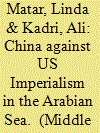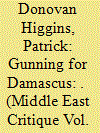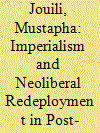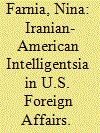|
|
|
Sort Order |
|
|
|
Items / Page
|
|
|
|
|
|
|
| Srl | Item |
| 1 |
ID:
192295


|
|
|
|
|
| Summary/Abstract |
When Oman joined China’s Belt and Road Initiative to pursue economic diversification, the US intervened to stop it. Although the foundation stone for Chinese investment plans was laid in 2017, these projects were put on hold, while the US rushed to bolster its military presence in Oman. The article studies Chinese investment in Oman, accounts for what has developed so far, and highlights the reasons for which the US acted to stem the potential of non-oil development in Oman. The disruption of the China-Oman diversification project resembles the US’s targeting of China’s policy of expansion by mutual cooperation elsewhere, but with a twist: Oman sits close to two vital chokepoints, the Bab Al-Mandeb and the Hormuz straits. The article argues that such obstruction is central to the US’s mode of accumulation by militarism. Keeping Oman from auto-developing and building its autonomy makes of it a pliable client state ready to serve as an imperialist post to empire.
|
|
|
|
|
|
|
|
|
|
|
|
|
|
|
|
| 2 |
ID:
192292


|
|
|
|
|
| Summary/Abstract |
Commentators across Anglophone media and academic institutions frequently have minimized the role of US-led imperialism in Syria. This trivialization has been made possible by the covert nature of the war’s initial phases. Therefore, this article aims to piece together some of the most conspicuous aspects of the empirical record of the war. It begins with a historical overview of major US attacks against Syria, as well as prevailing attitudes about Syria within the US National Security Establishment (NSE), between the end of the WWII and 2011. The second part aggregates and reviews the existing empirical record on the current war, beginning with the Bush Administration’s preparations for operations subsequently launched under the Obama Administration in 2011, then continuing to be waged under the following administrations. The conclusion offers some theoretical remarks on the wider regional context of the US’s aims in Syria, highlighting their connections to various developments elsewhere in the region, ranging from similar wars nearby, to recent political losses suffered by the Palestinian national movement.
|
|
|
|
|
|
|
|
|
|
|
|
|
|
|
|
| 3 |
ID:
192291


|
|
|
|
|
| Summary/Abstract |
Since the early 1970s, neoliberalism has not spared Tunisia’s subordinate integration into the global capitalist system. This process strengthened a dominant ruling class, closely connected to international capital interests, while leading to growing social polarization and rising socio-economic inequalities. Faced by popular resistance, authoritarianism, with the support of imperialist powers, became the needed political response to consolidate the neoliberal project. Beyond some democratic achievements, the 2011 uprising has failed to undo the development model at work. The imperialist powers, with the complicity of the ruling classes, were able to hijack the movement and direct it towards what I call an orderly transition, whose strategies entailed the use of financial aid and military assistance.
|
|
|
|
|
|
|
|
|
|
|
|
|
|
|
|
| 4 |
ID:
192289


|
|
|
|
|
| Summary/Abstract |
This article provides a conceptual background to the general theme of this Special Issue ‘On Imperialism in the Middle East’. First, we posit that the concept of imperialism can be understood as a sociological process, through an approach that centres the primacy of politics vis-à-vis accounts that sever theory and praxis via empiricism. In probing this issue, the article shows how dominant academic narratives explaining wars in the region disarticulate them from history. Second, we show that wars, waste, and militarism—also termed as accumulation by waste—are the predominant activities of the US-led imperialist age, historically unleashed on the South of the world. Consequently, we end discussing how the study of US-led imperialism becomes the focus around which each article in this issue recentres its analytical contribution.
|
|
|
|
|
|
|
|
|
|
|
|
|
|
|
|
| 5 |
ID:
192293


|
|
|
|
|
| Summary/Abstract |
This article challenges the anti-structural and ahistorical turn in recent histories of the Iranian Revolution. Tracing the genealogy of this anti-structural turn to the publication of Foucault’s writings on Iran, the author argues that the continued decline of US-Iran relations, coupled with hostility toward anti-imperialist scholarship in US academia, has created the conditions for an ahistoricism in US-based scholarship on Iran. This turn is further exacerbated by the lack of accessible archives to enable rigorous analyses of the Revolution. The article concludes by distinguishing between an intellectual, one who challenges the status quo to create a more just world, and a functionary, whose scholarly contributions are guided by the precepts of foundation funding and the State Department. Ultimately the article calls for a transformation in Iranian Studies toward radical intellectualism.
|
|
|
|
|
|
|
|
|
|
|
|
|
|
|
|
| 6 |
ID:
192294


|
|
|
|
|
| Summary/Abstract |
This article engages with Patrick Wolfe’s theoretical underpinnings and programmatic consequences of his settler-colonial theory. It contextualizes the renaissance of the settler-colonial paradigm, scrutinizing its theoretical innovations. In doing so, the article traces Wolfe’s work back to its origin in the work of Marcel Mauss and his notion of total social facts, discussing this theory’s political orientation around anti-racism and liberal subjectivity. It then shows how Wolfe applies his theory to Palestine, erasing class divisions and imperialism, militating against the theory and practice of national liberation. In conclusion it reflects on the use and limits of this theory for supporting anti-systemic struggle.
|
|
|
|
|
|
|
|
|
|
|
|
|
|
|
|
| 7 |
ID:
192290


|
|
|
|
|
| Summary/Abstract |
This article examines the rearticulation and reconfiguration of US-led imperialism vis-à-vis Tunisia in the aftermath of the 2010–2011 popular revolt. Challenging the prevalent economic-military binary in analyses of US-led imperialism in the region, it treats instead economic intervention in Tunisia as linked to and shaped by ‘security’ intervention, with the violence of the War on Terror laying the groundwork for a new wave of primitive accumulation. Employing conjunctural analysis, it considers how the 2015 attacks, largely targeting European tourists at a Sousse beach resort and the Bardo national museum, were mobilized to further Tunisia’s imbrications within imperialist security architecture through legal interventions, border violence, peripheral militarization, increased ‘security’ spending and neocolonial ‘expertise’, debt and racialized financialization. In doing so, the 2015 security conjuncture reinforced Tunisia’s peripheral status in the international system and enabled further surplus value drain, though not without resistance. The article concludes by reflecting on popular struggles and the current conjuncture, which is characterized not only by public health and economic crises, but also by the rise of a multipolar world order that, when combined with working class organization and mobilization, may provide an opening for Tunisia to delink from the imperialist core. Such a transformation would domore than any platitudes about human rights and ‘security sector reform’ to radically transform the nature of the Tunisian security state and the social relations it is designed to uphold.
|
|
|
|
|
|
|
|
|
|
|
|
|
|
|
|
|
|
|
|
|